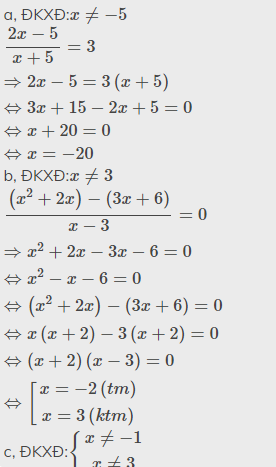Giải các phương trình:
Hãy nhập câu hỏi của bạn vào đây, nếu là tài khoản VIP, bạn sẽ được ưu tiên trả lời.


\(a,\left(x-6\right)\left(2x-5\right)\left(3x+9\right)=0\Leftrightarrow\left[{}\begin{matrix}x-6=0\Leftrightarrow x=6\\2x-5=0\Leftrightarrow x=\dfrac{5}{2}\\3x+9=0\Leftrightarrow x=-3\end{matrix}\right.\)
\(b,2x\left(x-3\right)+5\left(x-3\right)=0\Leftrightarrow\left(2x+5\right)\left(x-3\right)=0\Leftrightarrow\left[{}\begin{matrix}x-3=0\Leftrightarrow x=3\\2x+5=0\Leftrightarrow x=-\dfrac{5}{2}\end{matrix}\right.\)
\(c,x^2-4-\left(x-2\right)\left(3-2x\right)=0\Leftrightarrow\left(x-2\right)\left(x+2\right)-\left(x-2\right)\left(3-2x\right)=0\Leftrightarrow\left(x-2\right)\left(x+2-3+2x\right)=0\Leftrightarrow\left[{}\begin{matrix}x=2\\x=\dfrac{1}{3}\end{matrix}\right.\)
\(x=-7\left(2m-5\right)x-2m^2+8\Leftrightarrow x+7\left(2m-5\right)=8-2m^2\Leftrightarrow x\left(14m-34\right)=8-2m^2\)
\(ycđb\Leftrightarrow14m-34\ne0\Leftrightarrow m\ne\dfrac{34}{14}\)\(\Rightarrow x=\dfrac{8-2m^2}{14m-34}\)
\(3.17\Leftrightarrow4x^2-4x+1-2x-1=0\Leftrightarrow4x^2-6x=0\Leftrightarrow x\left(4x-6\right)=0\Leftrightarrow\left[{}\begin{matrix}x=0\\x=\dfrac{3}{2}\end{matrix}\right.\)
3.15:
a, \(\Leftrightarrow\left\{{}\begin{matrix}x-6=0\\2x-5=0\\3x+9=0\end{matrix}\right.\Leftrightarrow\left\{{}\begin{matrix}x=6\\x=\dfrac{5}{2}\\x=-\dfrac{9}{3}=-3\end{matrix}\right.\)
b, \(\Leftrightarrow\left(x-3\right)\left(2x+5\right)=0\)
\(\Leftrightarrow\left\{{}\begin{matrix}x-3=0\\2x+5=0\end{matrix}\right.\Leftrightarrow\left\{{}\begin{matrix}x=3\\x=-\dfrac{5}{2}\end{matrix}\right.\)
c, \(\Leftrightarrow\left(x-2\right)\left(x+2\right)-\left(x-2\right)\left(3-2x\right)=0\)
\(\Leftrightarrow\left(x-2\right)\left(x+2-3+2x\right)=0\)
\(\Leftrightarrow\left\{{}\begin{matrix}x-2=0\\3x-1=0\end{matrix}\right.\Leftrightarrow\left\{{}\begin{matrix}x=2\\x=\dfrac{1}{3}\end{matrix}\right.\)
3.16
\(\Leftrightarrow\left(2m-5\right).-7-2m^2+8=0\)
\(\Leftrightarrow-14m+35-2m^2+8=0\)
\(\Leftrightarrow-14m-2m^2+43=0\)
\(\Leftrightarrow-2\left(7m+m^2\right)=-43\)
\(\Leftrightarrow m\left(7-m\right)=\dfrac{43}{2}\)
\(\Leftrightarrow\dfrac{m\left(7-m\right)}{1}-\dfrac{43}{2}=0\)
\(\Leftrightarrow\dfrac{14m-2m^2}{2}-\dfrac{43}{2}=0\)
pt vô nghiệm

Ta có:


⇔ 4x + 20 + 3x + 36 - 5x + 10 = 2x + 66
⇔ 0x = 0
⇒ Phương trình đã cho vô số nghiệm.
Vậy phương trình đã cho vô số nghiệm.

Bài `1:`
`h)(3/4x-1)(5/3x+2)=0`
`=>[(3/4x-1=0),(5/3x+2=0):}=>[(x=4/3),(x=-6/5):}`
______________
Bài `2:`
`b)3x-15=2x(x-5)`
`<=>3(x-5)-2x(x-5)=0`
`<=>(x-5)(3-2x)=0<=>[(x=5),(x=3/2):}`
`d)x(x+6)-7x-42=0`
`<=>x(x+6)-7(x+6)=0`
`<=>(x+6)(x-7)=0<=>[(x=-6),(x=7):}`
`f)x^3-2x^2-(x-2)=0`
`<=>x^2(x-2)-(x-2)=0`
`<=>(x-2)(x^2-1)=0<=>[(x=2),(x^2=1<=>x=+-2):}`
`h)(3x-1)(6x+1)=(x+7)(3x-1)`
`<=>18x^2+3x-6x-1=3x^2-x+21x-7`
`<=>15x^2-23x+6=0<=>15x^2-5x-18x+6=0`
`<=>(3x-1)(5x-1)=0<=>[(x=1/3),(x=1/5):}`
`j)(2x-5)^2-(x+2)^2=0`
`<=>(2x-5-x-2)(2x-5+x+2)=0`
`<=>(x-7)(3x-3)=0<=>[(x=7),(x=1):}`
`w)x^2-x-12=0`
`<=>x^2-4x+3x-12=0`
`<=>(x-4)(x+3)=0<=>[(x=4),(x=-3):}`
`m)(1-x)(5x+3)=(3x-7)(x-1)`
`<=>(1-x)(5x+3)+(1-x)(3x-7)=0`
`<=>(1-x)(5x+3+3x-7)=0`
`<=>(1-x)(8x-4)=0<=>[(x=1),(x=1/2):}`
`p)(2x-1)^2-4=0`
`<=>(2x-1-2)(2x-1+2)=0`
`<=>(2x-3)(2x+1)=0<=>[(x=3/2),(x=-1/2):}`
`r)(2x-1)^2=49`
`<=>(2x-1-7)(2x-1+7)=0`
`<=>(2x-8)(2x+6)=0<=>[(x=4),(x=-3):}`
`t)(5x-3)^2-(4x-7)^2=0`
`<=>(5x-3-4x+7)(5x-3+4x-7)=0`
`<=>(x+4)(9x-10)=0<=>[(x=-4),(x=10/9):}`
`u)x^2-10x+16=0`
`<=>x^2-8x-2x+16=0`
`<=>(x-2)(x-8)=0<=>[(x=2),(x=8):}`

a, ĐKXĐ:\(x\ne-5\)
\(\dfrac{2x-5}{x+5}=3\\ \Rightarrow2x-5=3\left(x+5\right)\\ \Leftrightarrow3x+15-2x+5=0\\ \Leftrightarrow x+20=0\\ \Leftrightarrow x=-20\)
b, ĐKXĐ:\(x\ne3\)
\(\dfrac{\left(x^2+2x\right)-\left(3x+6\right)}{x-3}=0\\ \Rightarrow x^2+2x-3x-6=0\\ \Leftrightarrow x^2-x-6=0\\ \Leftrightarrow\left(x^2+2x\right)-\left(3x+6\right)=0\\ \Leftrightarrow x\left(x+2\right)-3\left(x+2\right)=0\\ \Leftrightarrow\left(x+2\right)\left(x-3\right)=0\\ \Leftrightarrow\left[{}\begin{matrix}x=-2\left(tm\right)\\x=3\left(ktm\right)\end{matrix}\right.\)
c, ĐKXĐ:\(\left\{{}\begin{matrix}x\ne-1\\x\ne3\end{matrix}\right.\)
\(\dfrac{x}{2\left(x-3\right)}+\dfrac{x}{2x+2}=\dfrac{2x}{\left(x+1\right)\left(x-3\right)}\\ \Leftrightarrow x\left(\dfrac{1}{2\left(x-3\right)}+\dfrac{1}{2\left(x+1\right)}-\dfrac{2}{\left(x+1\right)\left(x-3\right)}\right)=0\\ \Leftrightarrow x\left(\dfrac{x+1}{2\left(x-3\right)\left(x+1\right)}+\dfrac{x-3}{2\left(x+1\right)\left(x-3\right)}-\dfrac{4}{2\left(x+1\right)\left(x-3\right)}\right)=0\\ \Leftrightarrow x.\dfrac{x+1+x-3-4}{2\left(x-3\right)\left(x+1\right)}=0\\ \Leftrightarrow\dfrac{x\left(2x-6\right)}{2\left(x-3\right)\left(x+1\right)}=0\\ \Leftrightarrow\dfrac{2x\left(x-3\right)}{2\left(x-3\right)\left(x+1\right)}=0\\ \Leftrightarrow\dfrac{x}{x+1}=0\\ \Rightarrow x=0\left(tm\right)\)

a: Ta có: \(3x-5\ge2\left(x-6\right)-12\)
\(\Leftrightarrow3x-5\ge2x-24\)
hay \(x\ge-19\)
b: Ta có: \(2\left(5-2x\right)\ge3-x\)
\(\Leftrightarrow10-4x-3+x\ge0\)
\(\Leftrightarrow-3x\ge-7\)
hay \(x\le\dfrac{7}{3}\)

a, đk : x khác 5;-6
\(x^2+12x+36+x^2-10x+25=2x^2+23x+61\)
\(\Leftrightarrow2x+61=23x+61\Leftrightarrow21x=0\Leftrightarrow x=0\)(tm)
b, đk : x khác 1;3
\(x^2+2x-15=x^2-1-8\Leftrightarrow2x-15=-9\Leftrightarrow x=3\left(ktmđk\right)\)
pt vô nghiệm
a, đk : x khác 5;-6
x2+12x+36+x2−10x+25=2x2+23x+61x2+12x+36+x2−10x+25=2x2+23x+61
⇔2x+61=23x+61⇔21x=0⇔x=0⇔2x+61=23x+61⇔21x=0⇔x=0(tm)
b, đk : x khác 1;3
x2+2x−15=x2−1−8⇔2x−15=−9⇔x=3(ktmđk)x2+2x−15=x2−1−8⇔2x−15=−9⇔x=3(ktmđk)
pt vô nghiệm

`5-(x-6)=4(3-2x)`
`<=>5-x+6-4(3-2x)=0`
`<=> 5-x+6-12 +8x=0`
`<=> 7x -1=0`
`<=> 7x=1`
`<=>x=1/7`
Vậy pt đã cho có nghiệm `x=1/7`
__
`3-x(1-3x) =5(1-2x)`
`<=> 3-x+3x^2=5-10x`
`<=> 3-x+3x^2-5+10x=0`
`<=> 3x^2 +9x-2=0`
\(\Leftrightarrow\left[{}\begin{matrix}x=\dfrac{-9+\sqrt{105}}{6}\\x=\dfrac{-9-\sqrt{105}}{6}\end{matrix}\right.\)
Vậy pt đã cho có tập nghiệm \(S=\left\{\dfrac{-9+\sqrt{105}}{6};\dfrac{-9-\sqrt{106}}{5}\right\}\)
__
`(x-3)(x+4) -2(3x-2)=(x-4)^2`
`<=>x^2+4x-3x-12- 6x +4 =x^2 -8x+16`
`<=>x^2-5x-8=x^2-8x+16`
`<=> x^2 -5x-8-x^2+8x-16=0`
`<=> 3x-24=0`
`<=>3x=24`
`<=>x=8`
Vậy pt đã cho có nghiệm `x=8`
a) 5-(x-6)=4(3-2x)
=> 5 – x + 6 = 12 – 8x
=> -x + 8x = 12 – 5 – 6
=> 7x = 1
=> x=1/7
Vậy phương trình có nghiệm x=1/7
b) 3 - x ( 1 - 3x)=5(1-2x)
=> 3-x+3x^2=5-10x
=> 3x^2+9x-2= 0
0=105
=> x =\(\dfrac{-9-\sqrt{105}}{6}\)

Bạn cần viết đề bằng công thức toán (biểu tượng $\sum$ góc trái khung soạn thảo) đẻ được hỗ trợ tốt hơn. Viết như thế kia rất khó đọc => khả năng bị bỏ qua bài cao.
a: =>3x=3
=>x=1
b: =>12x-2(5x-1)=3(8-3x)
=>12x-10x+2=24-9x
=>2x+2=24-9x
=>11x=22
=>x=2
c: =>2x-3(2x+1)=x-6x
=>-5x=2x-6x-3=-4x-3
=>-x=-3
=>x=3
d: =>2x-5=0 hoặc x+3=0
=>x=5/2 hoặc x=-3
e: =>x+2=0
=>x=-2

x + 2 x - 5 + 3 = 6 2 - x
Điều kiện xác định: x ≠ 5; x ≠ 2.
Quy đồng và khử mẫu ta được :
(x + 2)(2 – x) + 3(2 – x)(x – 5) = 6(x – 5)
⇔ 4 – x2 + 6x – 3x2 – 30 + 15x = 6x – 30
⇔ 4 – x2 + 6x – 3x2 – 30 + 15x – 6x + 30 = 0
⇔ -4x2 + 15x + 4 = 0
Có a = -4; b = 15; c = 4 ⇒ Δ = 152 – 4.(-4).4 = 289 > 0
Phương trình có hai nghiệm phân biệt:
Cả hai giá trị đều thỏa mãn điều kiện.
Vậy phương trình có tập nghiệm